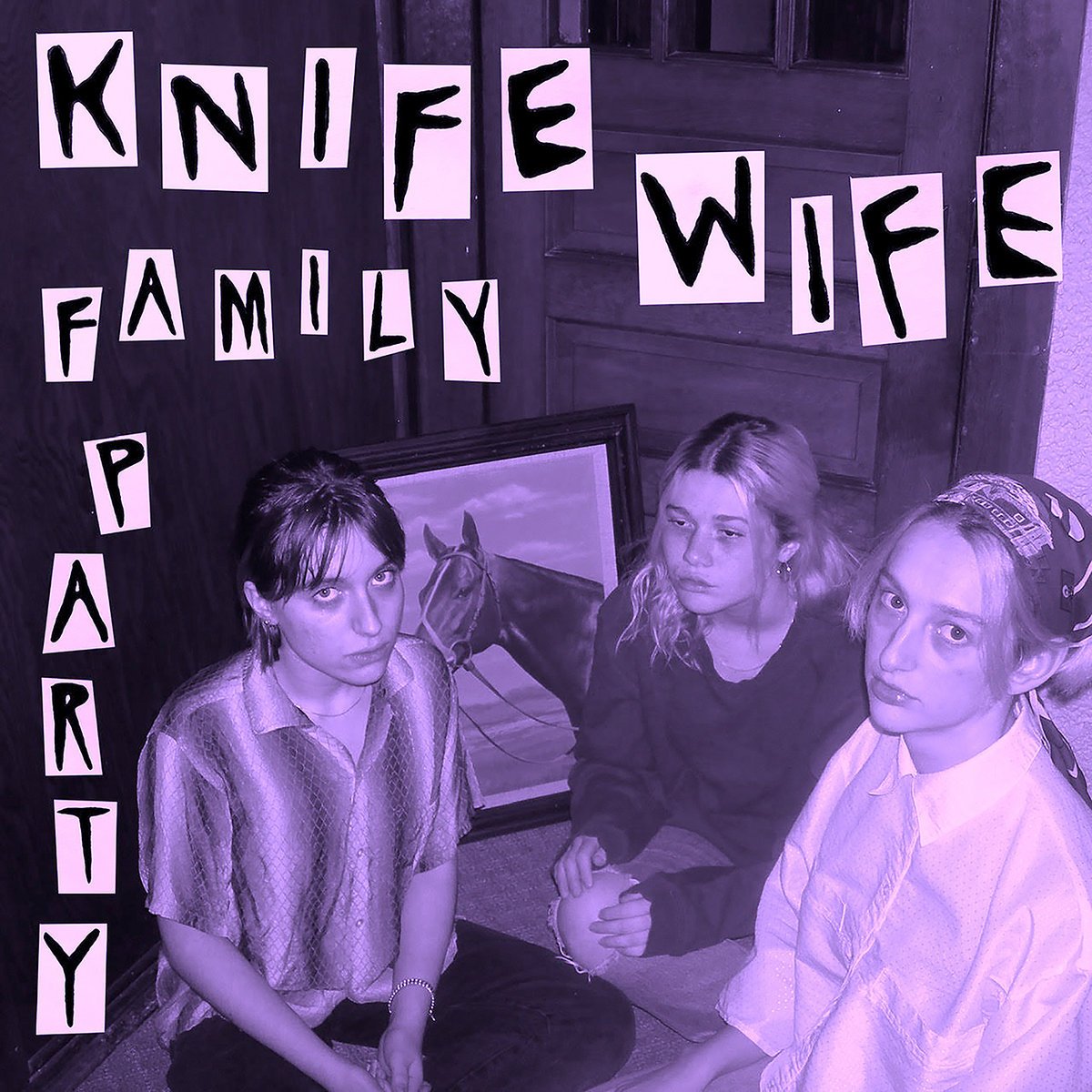Minimalism as an aesthetic choice tends to carry with it a series of associations: high art, European cool (think Bauhaus), a certain veneer of artistic distance. But punk has always had a different relationship to minimalism, viewing it as that which makes space for exhaustive emotional intensity. Washington D.C. trio Knife Wife, in their debut album, “Family Party” (2019), both perpetuate and distinguish themselves from tradition in their melding of punk, post-punk, and minimalist electro-punk into one viscerally and wonderfully weird whole.
Opening track “Dreamland” quickly establishes the intense lethargy that pervades the album like a thick, pungent cloud. A bare, repeated, post-punky riff and basic backing drums set the stage for the lyrics, which (as on the rest of the album) present a toxic and fascinating mix of bodily disgust, desire, depressive irony and adolescent ennui. This perverse and powerful statement of deep alienation is somehow never fully repellant or merely gross-out, but is “delightfully-induced nausea”; an audacious combination of pleasure, disgust, and irony.
“Silly Pony,” the second track, brings the intensity up a bit after a bare-bones beginning, using loud-soft dynamics as it launches into its echoey, guitar-driven chorus. The uncanny conflation of disgust and desire continues, as we get some of the most wonderfully bizarre lines on the album, like “I’ll collect your used band-aids/Until my infatuation fades” and “I’ll lick every tooth in your mouth/Even the ones that haven’t started to grow.” An understandable reaction: wow, that’s pretty gross. But, beyond visceral disgust, the lyrics here are remarkably effective at carrying across the sense of desperate desire.
“Reptile” and “The Dentist’ continue to develop the style and tone of the album, though they don’t stand out as much as the preceding tracks. “The Dentist” presents a great interplay between a minimal repeated guitar riff and a primal, powerful drum backbeat, plus throws in fun stuff like a choral intro. “Every Living Thing” is more of an interlude than a song, providing a little sonic clearing in the midst of the album in preparation for the next song.
“Lobe” is a great introduction to the second half of the album. A sinister guitar line compliments the staccato and alternatively talk-sung and screamed vocal delivery. Lyrically, gender and power clearly enter the picture: though they are certainly not themes that are completely absent earlier on in the album, here they really come into their own. The repetition of lines like “A veil to wear/A thumb to suck/A mirror to share” present the perverseness, ugliness, and limitations of traditional constructions of femininity. The following track, “Cheek” — sonically an intensified version of “Lobe”— has some of the most intense, raw, and weird vocals on the album. What sets it apart is the call-and-response vocalizations that act as a kind of percussive force, structuring the track and driving it forward.
“Fruity Void” represents a point of serious departure instrumentally, as a repeated whirling synth sound defines its tone. This, coupled with the lethargic vocal delivery, minimal electronic percussion, and eventually, mirrored call-and-response vocals, make for an utterly bizarre track.
“Angel Face” continues the experimentation, though steps back more into post-punk territory in its utilization of an angular guitar line. That being said, this track’s waves of synths and much more melodic singing (as opposed to the talk-singing that predominates over much of the rest of the album) set it apart. Lyrically, this song continues the theme of revulsion: disgust and desire are endlessly and ironically entwined.
Album closer “Dogs” is a satisfying conclusion, blending overlapping vocals, choral melodies, and powerful guitar lines. Lyrically, it’s not the most remarkable track on the album, but its sonic identity manages to represent several different tendencies spread across the album in one song.
Yes, listening to “Family Party” is, at times, pretty revolting. But its ability to, on both a musical and lyrical level, lean into all the weirdness of that — the ways in which disgust and desire are intermixed and can define and bleed into one another —is remarkable and unique. That this is a particularly punk achievement seems undeniable: in the context of modern punk’s sometimes myopic focus on its own past, “Family Party” fearlessly moves forward, casting off convention both thematically and sonically.
Contact Palmer Manes at palmerm ‘at’ stanford.edu.
